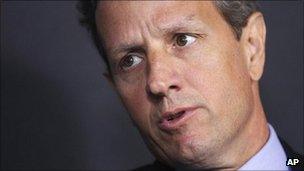Geithner wants 'firewall' against crisis spreading
- Published

Mr Geithner met eurozone leaders earlier this month
US Treasury Secretary Timothy Geithner has called on European leaders to take urgent new steps to create a "firewall" against the crisis spreading.
He added that decisions on how to tackle eurozone debt could not wait "until the crisis gets more severe".
The warning came in comments to the IMF and World Bank meeting in Washington.
In an earlier interview with the BBC Mr Geithner called for a "decisive signal" that leaders have a strategy for tackling the debt crisis.
But he added he was confident that Europe would do what was necessary.
On Thursday, IMF chief Christine Lagarde said collective action was needed to remove economic uncertainty.
UK Chancellor George Osborne has also warned that European leaders have six weeks to end the crisis.
G20 finance ministers are currently meeting in Washington, which is also hosting the annual meeting of the World Bank and the International Monetary Fund (IMF).
Classic dynamic
Mr Geithner's comments come at the end of another week of volatility on the world's share markets. The UK's FTSE 100 fell 3.6% over the week, France's Cac 40 shed 4.4% and in the US the Dow Jones dropped 6.4%, its biggest weekly fall since October 2008.
"The most important thing that needs to happen now is to see a more decisive signal from the European leaders, that they have a strategy that can restore confidence in their will to assault this," he said.
Speaking to Martin Wolf for a forthcoming BBC Radio 4, external documentary, Mr Geithner said that it was important to see fast action.
"These things have the classic dynamic that the longer you wait, the harder it is to solve, the more expensive it is to solve. There's a huge premium on early action."
The G20 has given little hint of what action it may take, but markets have long been calling for a substantial increase in the eurozone's communal bailout fund, the European Financial Stability Facility (EFSF), from its agreed level of 440bn euros ($596bn; £385bn).
Many investors also want the eurozone to issue bonds guaranteed by every one of the 17-member nations - so-called eurobonds. However, a number of policymakers, particularly those in Germany, have resisted the idea.
In July, European finance ministers proposed making the EFSF more flexible, allowing it to buy individual government bonds - which would bring down the cost of borrowing for heavily indebted nations - and to offer emergency credit lines to banks. However, the proposals have not yet been ratified.
Regaining confidence
Mr Geithner acknowledged that the US was not blameless in the crisis.
"We're hardly in a position to cast aspersions on the quality of political action you're seeing around the world because our politics are so difficult.
"And of course we did a lot of damage to the world in the early stages of the crisis, but we also responded with force and alacrity," he said.
But Mr Geithner, who was invited to a meeting of eurozone finance ministers in Poland earlier this month, said he felt Europe's leaders could regain markets' confidence.
"I believe, on the basis of all my private conversations, that the leadership of Europe are going to move more forcefully and do what's necessary to reverse this erosion of confidence."
You can hear more from Timothy Geithner in a special BBC Radio 4 documentary presented by Martin Wolf to be broadcast in November.